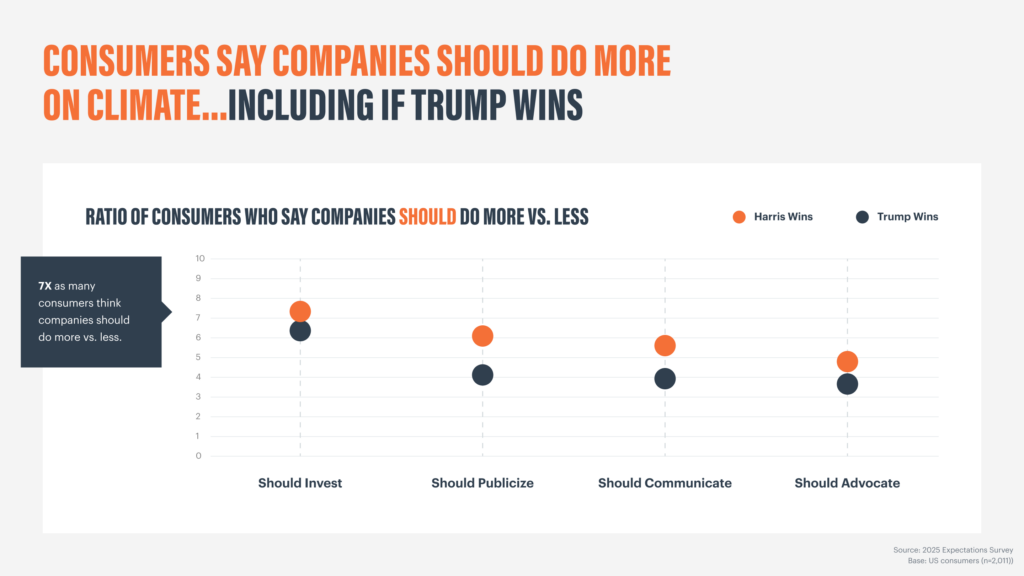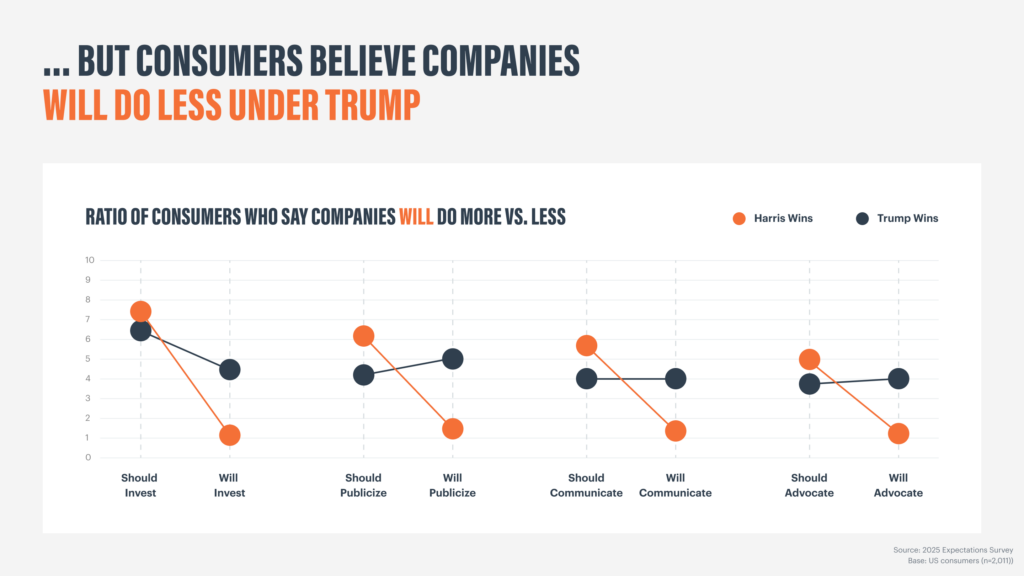What Do Consumers Expect from Companies on Climate Action in 2025?
Insights from the latest research by maslansky + partners in conjunction with Potential Energy Action Network
Over the last 18 months, maslansky + partners, in partnership with Potential Energy Action Network, has delved deeply into consumer and investor expectations around Environmental, Social, and Governance (ESG) issues. Our latest round of research, conducted in late August and early September 2024, surveyed 2,000 U.S. consumers to understand how political shifts—specifically a Trump or Harris presidency—might influence expectations for corporate climate action in 2025.
Key Finding: Strong, Unwavering Support for Climate Action
Regardless of who is elected president, the message from consumers is clear: companies should continue their commitment to climate action. Our data shows that under either administration, consumers overwhelmingly expect companies to increase their climate efforts rather than scale back. The chart below illustrates that a significant majority believe companies should do “more” on climate—outweighing those who think they should do “less” by a wide margin. The numbers indicate that under a Harris presidency, six times as many consumers favor increased investment in climate action, while that figure jumps to seven times as many under a Trump presidency.
This data underscores an important trend: climate expectations from consumers intensify when political conditions signal uncertainty or potential policy rollbacks. In the case of a Trump presidency, marked by proposed reversals on climate policies, consumers indicate they want companies to step up their commitments even more than they would under Harris.

Consumer Expectations: Investment, Communication, and Advocacy on Climate
We explored four critical areas of climate action where consumers expect companies to engage actively:
1. Investment in Climate Action: Consumers expect companies to prioritize climate-focused investments, particularly in a Trump presidency, where seven times as many believe that businesses should do more versus less.
2. Publicizing Climate Actions: There is a strong call for companies to transparently showcase their climate initiatives, keeping stakeholders informed on the steps taken to reduce environmental impact.
3. Communicating Climate Commitments: Consumers expect consistent and clear communication about climate goals, seeing it as a signal of accountability and transparency.
4. Advocating for Climate Issues: Companies are also expected to engage in advocacy, lending their influence to shape policies supporting environmental sustainability.
Expectations vs. Perceptions of Corporate Response
Our research also uncovered a notable discrepancy between what consumers believe companies should do and what they believe companies will do under each presidency. While consumers largely think companies will meet expectations in a Harris administration, they anticipate a significant shortfall under Trump. Particularly in the areas of investment, publicizing, communicating, and advocating for climate action, consumers expect companies may shy away from these actions in a Trump presidency. These gaps between expectation and perceived action are concerning for companies; failing to meet climate expectations could erode trust and damage brand reputation.

What Happens if Climate Policies Roll Back?
We specifically asked consumers how companies should respond if Trump were to withdraw the U.S. from the Paris Agreement or reduce climate funding through actions like cutting the Inflation Reduction Act (IRA). The data indicates a clear mandate from consumers: most believe that companies should not use these policy shifts as an excuse to backtrack on their climate commitments.

Three main actions emerged as consumer expectations:
1. Increase Climate Commitments: In the face of policy rollbacks, consumers expect companies to redouble their climate efforts.
2. Reaffirm Climate Goals: Public declarations of continued commitment to climate goals resonate strongly with consumers as a sign of resilience and reliability.
3. Maintain Existing Climate Commitments: Even if federal policies change, consumers want companies to remain steadfast in their own climate objectives.
In fact, fewer than one in five consumers believe companies should reduce climate commitments under these scenarios, underscoring the high expectations consumers place on corporations to lead on climate, independent of government action.
Moving Forward: Meeting the Challenge of Climate Expectations
The findings from this research reveal that U.S. consumers expect companies to lead on climate, regardless of political headwinds. As we look toward 2025, businesses should consider these insights as they strategize their ESG efforts:
1. Commit to Bold Climate Investments: Significant investment in sustainability initiatives will help meet rising consumer expectations.
2. Emphasize Transparency: Consumers expect visibility on climate efforts. Publicizing actions and communicating commitments will reinforce trust.
3. Stand Firm on Advocacy: Advocacy remains an essential aspect of consumer expectations, especially in the event of policy fluctuations.
As the research shows, consumer support for climate action by companies remains robust. Navigating these expectations will not only help companies align with public sentiment but also bolster reputation and trust as leaders in the sustainability movement, regardless of the political landscape.





